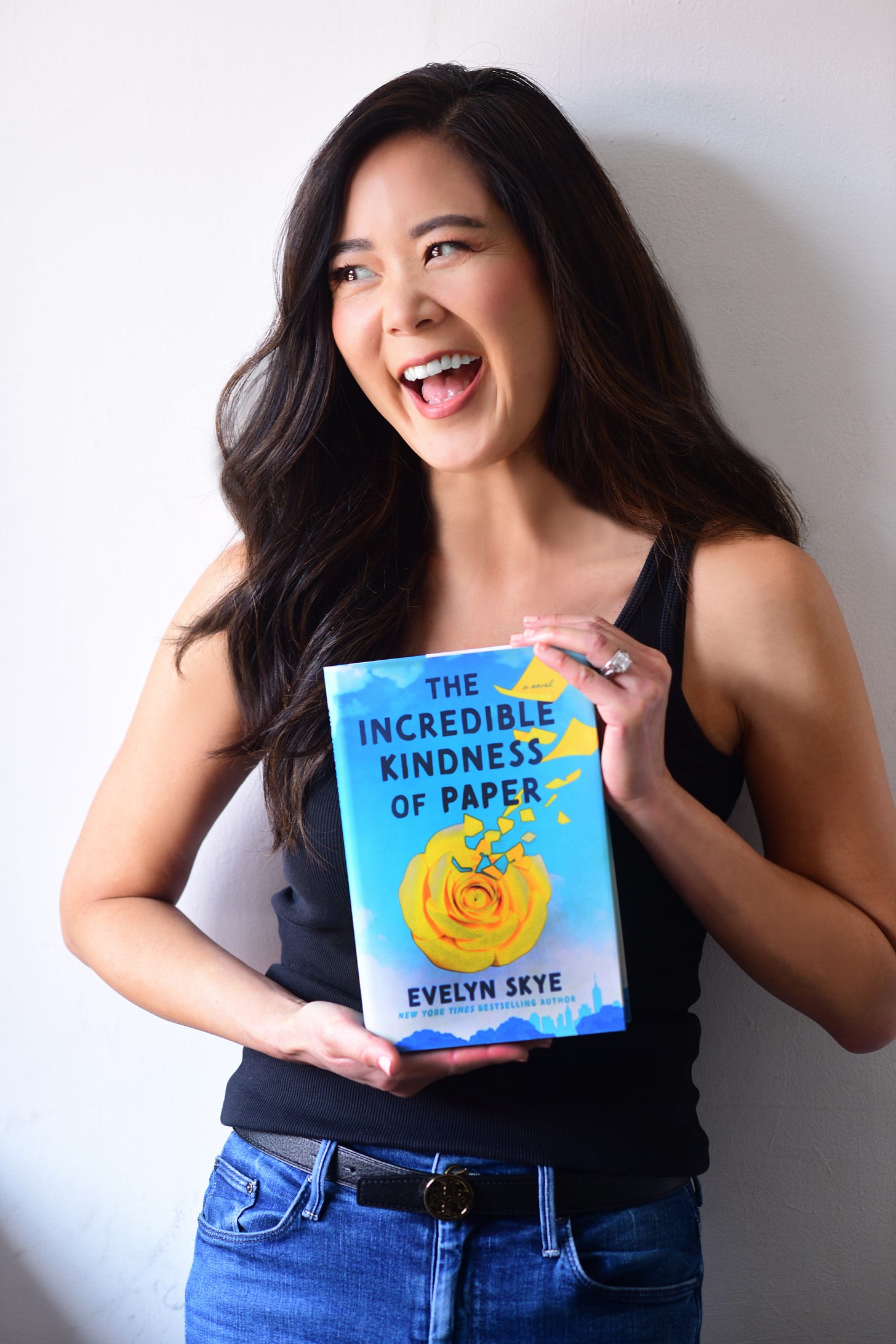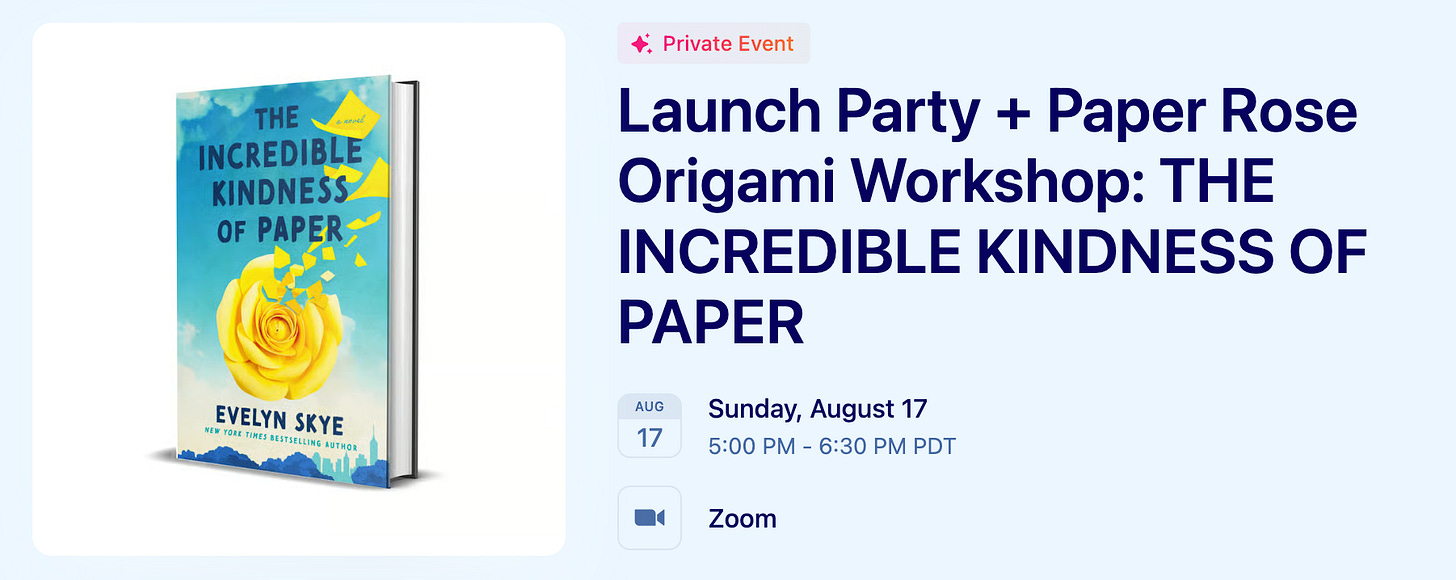Feel-Good Books: The Fear of Writing about Hope and Optimism in a Skeptical World
+ The Character Who Is Most Like Me
Hello, Protagonists,
Welcome back to Letters from the Creative Life. These occasional essays explore the quieter corners of living: small reflections on art, ambition, and the tender balancing act of building a meaningful life in a noisy world. Think of them as letters from my life to yours.
The Fear of Writing about Hope and Optimism in a Skeptical World
Have you experienced the silence of an Uber ride?
You slide into the backseat, mumble your name and destination if the driver asks, and then both of you retreat into your separate digital worlds. No eye contact through the rearview mirror. No small talk about the weather or the traffic. Just two humans sharing space while remaining fundamentally alone.
I found myself in one of these silent rides not too long ago, and it was so… profoundly sad. Here we were, supposedly more connected than ever through the magic of technology, yet I didn’t even think to ask a simple “how’s your day?” to the person three feet away from me.
That ride (and my discomfort and disappointment with myself) became a seed for what would eventually grow into The Incredible Kindness of Paper.
But this essay isn’t really about that Uber ride. It’s about why this particular book felt like holding a crystal heart in my hands, so precious and fragile that I kept it secret longer than I’ve ever kept any story. It’s about why, after nine novels, this one felt like it had to be perfect—or at least, it had to be right.
The Character Who Is Most Like Me
Chloe is the most “me” character I’ve ever written, and that terrified me.
She’s someone who sees silver linings not because she’s naive about darkness, but because she’s experienced enough of it to know that choosing hope is sometimes the bravest thing you can do. She’s the person who smiles at strangers in coffee shops, who leaves encouraging notes, who believes that small acts of kindness create ripples we can’t even imagine. She’s optimistic in a world that often mistakes optimism for stupidity.
And I was scared that readers would dismiss her—and by extension, me—as unrealistic, shallow, or worse, unintelligent.
Literary culture tends to celebrate darkness as depth, cynicism as sophistication. The assumption seems to be that if you’ve truly experienced life, you should emerge bitter, guarded, skeptical of human goodness.
But I’ve been through my share of genuine hardship—loss, heartbreak, seasons when hope felt impossible—and I still believe in the fundamental goodness of people. Not in spite of what I’ve experienced, but because of it.
Creating Chloe meant putting that worldview on the page and trusting that somewhere out there were readers who would recognize her as real, not naive. Readers who understand that choosing kindness isn’t about toxic positivity—it’s about informed optimism, the kind that sees the world clearly and still decides to act toward the light.
The Gift Wrapped in Gold Foil
The origami roses in the story came from a memory wrapped in love. When I was little, my grandmother would visit from Taiwan carrying gifts that seemed impossibly magical: origami cranes folded from the most beautiful paper I’d ever seen. Some had gold foil that caught the light. Others were covered in patterns so intricate they looked like tiny works of art.
She would make cranes so small they could balance on the tip of my pinkie, and others big enough to hang in chains across my bedroom. Each one was folded with such care, such intention. They had traveled across an ocean, carrying with them the kind of love that takes time to express—the slow, deliberate love of folding paper into something beautiful for someone you care about.
Those cranes taught me something about gifts that can’t be bought, and about how the most meaningful connections often happen through the smallest gestures. Sometimes, love can be folded into something as simple as paper and carry enough power to matter across continents and decades.
When Chloe started folding her yellow roses, she was channeling that same kind of intentional love—the belief that someone, somewhere, needed to know they were seen and valued.
The Hardest Part of Writing this Book
I’ve written books about magic and adventure, love and loss, but this felt different. This was my attempt to write hope itself, and hope is surprisingly difficult to capture authentically.
If I wrote Chloe too sweetly, she’d become Pollyanna—someone readers would roll their eyes at rather than root for.
If I made her world too perfect, the story would feel dishonest.
But if I swung too far toward cynicism, I’d lose the very thing I was trying to celebrate: the radical possibility that choosing kindness, even in dark times, can actually change things.
I needed readers to believe that someone like Chloe could exist in our actual world—the one with division and loneliness and genuine cruelty—and still make a difference. I needed them to see that her optimism wasn’t ignorance; it was courage.
Getting it right meant crafting a story where hope felt earned rather than given, where kindness felt powerful rather than weak, and where believing in people felt like wisdom rather than naivete.
The Dream I’m Almost Embarrassed to Admit
Here’s what I hope happens when this book reaches readers:
I dream of copies of The Incredible Kindness of Paper appearing in Little Free Libraries in neighborhoods everywhere, of copies left for strangers on subway cars and park benches with yellow post-it notes stuck on them that say, “Read me—I’m a gift to you”.
Like Chloe’s yellow paper roses finding their way to the people who need them most, I imagine this story finding the readers who didn’t even know they needed a smile tucked in between pages, but whose lives will be changed by the small act of kindness of a stranger leaving them a copy of this book.
It sounds impossibly idealistic, I know. But then again, so did the idea that Chloe, a guidance counselor who loses her job, might change the world one folded flower at a time.
More realistically, I hope readers close this book with slightly more faith in their own power to matter.
I hope the person reading on their commute looks up and smiles at someone.
I hope the reader having a difficult day realizes they could write themselves an encouraging note.
I hope people remember that it costs almost nothing to hold a door, offer a compliment, or simply acknowledge another human being’s existence.
Because even when the headlines are screaming and the world feels fractured, I truly believe that individual people are wonderful. Not all of them, not all the time, but enough of them to tip the balance of our lives toward something warmer and kinder if we’re willing to do our small part.
The Incredible Kindness of Paper is officially published and out in the world today, and I’m more nervous about this book than any I’ve written before. Not because I don’t believe in the story, but because I believe in it so completely. Chloe’s optimism is my optimism, her faith in people is my faith in people, and her small acts of courage are the ones I’m trying to fold more of into my own daily life.
If you’re someone who still believes—despite everything—that we’re more connected than we are divided, then this book is for you.
If you hold hope that individual kindness can create collective change, and that hope is a choice rather than a luxury, then this book is for you.
If you’ve ever told a cashier that you liked her earrings or simply smiled at a stranger because it felt like the right thing to do, then you already understand what Chloe knows: we have more power than we think to make each other’s lives a little brighter.
And maybe, if we’re very lucky, those small lights will multiply until they illuminate something bigger than any of us imagined possible.
Edit: A few weeks ago—after I’d written this essay but before I published it— one of our wonderful community members wrote me this comment (on my post about the importance of preordering books):
THANK YOU
for making my impossible dream of spreading joy and kindness with this book come true!!Get a copy for yourself or a reader in your life!
The Incredible Kindness of Paper is out today, and you can be one of the very first to hold this beautiful, tender, hopeful story in your hands.
🥰 Bonus: Buy an extra copy to leave in a Little Free Library or the subway and make my fanciful dream even more of a reality. 🥰
Autographed copies (limited time only):
If you want an autographed copy and you want to support an independent bookstore, you can preorder The Incredible Kindness of Paper at my local indie, Books Inc. Palo Alto.
Orders placed by 11:59pm Sunday, August 17th can be autographed and personalized with your name.
Just put a note in your online order that says:
PALO ALTO store: Autographed copy, please! Personalize to [insert your name].
Non-autographed copies everywhere!
The Incredible Kindness of Paper is also available at your favorite bookstore or online retailer:
Virtual Launch Party + Origami Workshop
You’re invited to my virtual Launch Party + Paper Rose Origami Workshop on Sunday, August 17th at 8pm ET / 5pm PT.
Come learn to fold your own messages of hope—I’d love to see you there!






wow this really hit me. i've been having such a cynical few months and honestly when i first saw the title i almost rolled my eyes thinking it would be another toxic positivity thing but your explanation about informed optimism really got to me. that distinction between naive hope and the kind of hope that comes AFTER you've seen darkness is so important.
i keep thinking about that uber ride you described - god how many times have i done exactly that?? just sitting there in awkward silence when a simple "how are you doing today" would cost me literally nothing. it's embarrassing but also kind of motivating?
anyway i'm definitely getting this book and maybe i'll actually follow through on leaving copies around like you suggested. seems like the kind of thing the world needs more of right now even if it feels a little silly to admit that out loudcongrats on the launch!!
{{Rightbackatchya}}